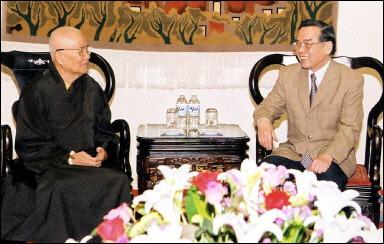For the first time in unified Vietnam, Prime Minister Phan Van Khai has met the leader of the banned Unified Buddhist Church of Vietnam (UBCV), Most Venerable Thich Huyen Quang in Hanoi to talk about the situation of the UBCV. The meeting took place today at 5.30 pm and lasted approx. 45 minutes.
Mr Vo Van Ai, Director of the International Buddhist Information Bureau welcomed the meeting as “an important first step”. “The fact that a Prime Minister holds talks with a prisoner of conscience who has spent 21 years in detention, and is still under effective house arrest is a significant event. Along with millions of Vietnamese Buddhists at home and abroad, I sincerely hope these talks will lead to concrete actions such as the release of Venerables Thich Huyen Quang and Thich Quang Do, and the re-establishment of the UBCV”.

During the meeting, Venerable Thich Huyen Quang said he had reminded Premier Phan Van Khai of the Government’s systematic repression against the UBCV, beginning immediately after the end of the Vietnam war in 1975. All UBCV property had been confiscated, its network of pagodas, schools, universities, hospitals and social institutions dismantled, and virtually all the UBCV leadership detained in prison or under house arrest. Thich Huyen Quang asked the Premier why the regime had so fiercely persecuted the UBCV and sought to suppress a 2,000-year tradition of Vietnamese Buddhism? Phan Van Khai admitted that “at first, we had many shortcomings and made many mistakes. But from now on, we will gradually put everything right”. To Thich Huyen Quang’s surprise, Phan Van Khai used typically Buddhist terms, saying “Venerable, please be compassionate and forgiving”.
Venerable Thich Huyen Quang then asked why the Government had placed him under detention without charge for the past 21 years, and why Venerable Thich Quang Do was under “administrative detention” in Ho Chi Minh City. Phan Van Khai did not reply directly, but inferred that Thich Quang Do’s detention was “an irrational decision made at a local level” and it was “not the policy of the State”. Thich Huyen Quang told the Premier that this was not the first time he had been arrested under the Communist regime. In the 1950s, along with many other Buddhists, he had taken part in the resistance movement for national independence, but had been arrested by the Communists in the Interzone 5 and detained without any explanation. Phan Van Khai replied : “Our nation commends your contribution to the country and our people”. After the meeting, the two men were photographed by the media, and the meeting was reported on national television.
Answering Vo Van Ai’s question’s about the practical outcome of the talks, Venerable Thich Huyen Quang said the Prime Minister had made no promises to release Thich Quang Do or himself. As for re-establishing the UBCV’s legitimate status, Phan Van Khai said “We already have the Vietnam Buddhist Church. That’s quite enough !”. The Patriarch said he would continue to press the Government until they satisfied the UBCV’s demands. Nevertheless, he said, the meeting was “a promising step” towards improvements in religious freedom. He added that international pressure had played a decisive role in bringing about the talks, and asked Mr Ai to thank all governments, Members of the European Parliament, the US Congress, the UN, human rights organizations and the international media for continuing to support the UBCV in its movement for religious freedom, democracy and human rights.
 Quê Me Quê Me: Action for democracy in Vietnam & Vietnam Committee on Human Rights
Quê Me Quê Me: Action for democracy in Vietnam & Vietnam Committee on Human Rights



